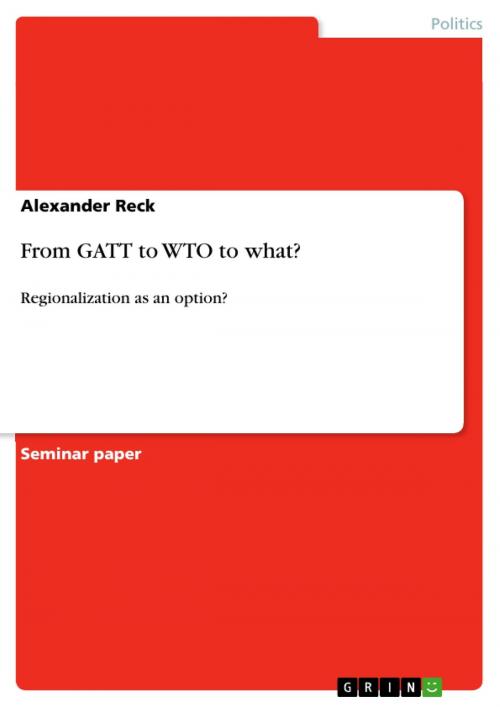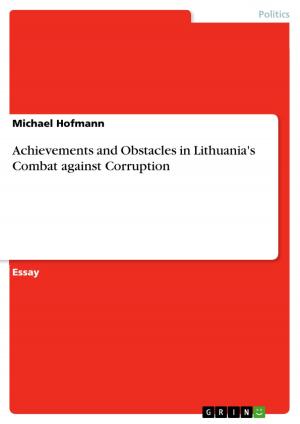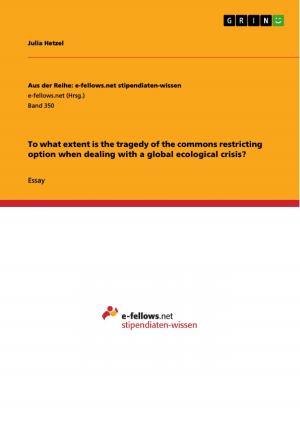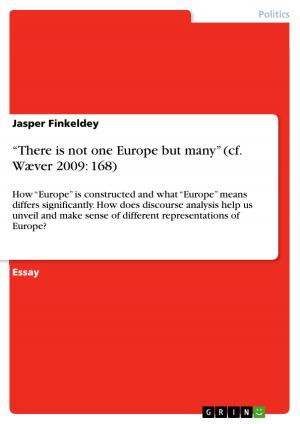From GATT to WTO to what?
Regionalization as an option?
Nonfiction, Social & Cultural Studies, Political Science, International, International Relations| Author: | Alexander Reck | ISBN: | 9783640553891 |
| Publisher: | GRIN Publishing | Publication: | March 3, 2010 |
| Imprint: | GRIN Publishing | Language: | English |
| Author: | Alexander Reck |
| ISBN: | 9783640553891 |
| Publisher: | GRIN Publishing |
| Publication: | March 3, 2010 |
| Imprint: | GRIN Publishing |
| Language: | English |
Seminar paper from the year 2008 in the subject Politics - International Politics - Topic: International Organisations, grade: 1,7, University of Potsdam, language: English, abstract: Die Ursprünge und aktuelle Problemstellungen des multilateralen Handelssystems. The multilateral trade Regime, the World Trade Organization, arrived, as so often in its past, at a cross road. The Doha Development Agenda is now in its 7th year, once again cancelled and once again tried to be revitalized. How come? On the one hand a broad consensus exists, saying that free trade is better for everyone. From farmers and fishermen to bankers and C.E.O.'s, everybody from white to blue-collar is supposed to gain welfare from global free trade. And those who don't even have collars can get some through trading. China's rise in the last decades is not imaginable without global trade. Almost 1 billion people profit from that and that is just one country! But on the other hand there are protectionist measures, bilateral overreaching treaties, subsidies for bankrupt industries and non-tariff barriers to trade installed from those countries that benefitted the most of the liberalizations of the past decades. Today the small ones, the former colonies, the developing countries try to pick their piece of the pie and are not willing to let the industrialized countries break the rules they used to engage years ago. They are not willing to take the inequality anymore and raise their voices in one of the only forums they have, where they're treated on a one to one basis. This essay will give an overview about the historic development from the General Agreement on Tariffs and Trade to the World Trade Organization. Their structures as well as their development will be pointed out. After exploring libraries full of literature to the topics of GATT and WTO, the remarkable text by Robert Winham about 'The evolution of the global trade regime' appeared to be the most comprehensive, intelligible and workable. Therefore it is one of the main sources of this essay. Last but not least regionalization and preferentialism will be explained in their different facets, concluding with two contrary empirical examples for economic and political integration. [...]
Seminar paper from the year 2008 in the subject Politics - International Politics - Topic: International Organisations, grade: 1,7, University of Potsdam, language: English, abstract: Die Ursprünge und aktuelle Problemstellungen des multilateralen Handelssystems. The multilateral trade Regime, the World Trade Organization, arrived, as so often in its past, at a cross road. The Doha Development Agenda is now in its 7th year, once again cancelled and once again tried to be revitalized. How come? On the one hand a broad consensus exists, saying that free trade is better for everyone. From farmers and fishermen to bankers and C.E.O.'s, everybody from white to blue-collar is supposed to gain welfare from global free trade. And those who don't even have collars can get some through trading. China's rise in the last decades is not imaginable without global trade. Almost 1 billion people profit from that and that is just one country! But on the other hand there are protectionist measures, bilateral overreaching treaties, subsidies for bankrupt industries and non-tariff barriers to trade installed from those countries that benefitted the most of the liberalizations of the past decades. Today the small ones, the former colonies, the developing countries try to pick their piece of the pie and are not willing to let the industrialized countries break the rules they used to engage years ago. They are not willing to take the inequality anymore and raise their voices in one of the only forums they have, where they're treated on a one to one basis. This essay will give an overview about the historic development from the General Agreement on Tariffs and Trade to the World Trade Organization. Their structures as well as their development will be pointed out. After exploring libraries full of literature to the topics of GATT and WTO, the remarkable text by Robert Winham about 'The evolution of the global trade regime' appeared to be the most comprehensive, intelligible and workable. Therefore it is one of the main sources of this essay. Last but not least regionalization and preferentialism will be explained in their different facets, concluding with two contrary empirical examples for economic and political integration. [...]















